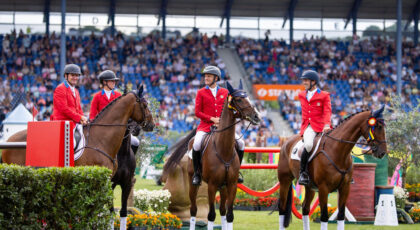Most of us understand that horses tend to have a “tricky” gastrointestinal system.
Sudden changes in feed, moldy hay, too much grain or lush grass—they can all wreak havoc on our horse’s health.
Many of us also know what kinds of treats or foods pass as “safe” to feed on occasion. Things like apples, carrots, or the occasional sugar cube (though not necessarily the healthiest option!). But there are several foods which horse owners might believe are safe, but actually aren’t.
Here are eight foods you should never feed your horse:
1. Chocolate

©russellstreet/Flickr CC
Like dogs, horses are also sensitive to the chemical, theobromine, in chocolate. Large amounts of cocoa can actually kill a horse, but even a small amount will test positive on a drug test.
2. Persimmons

The fibers and seeds of this fruit can cause a sticky mass known as a phytobezoar, which can become lodged within the gastrointestinal system, leading to colic. While persimmons might not be something you consider feeding to your horses, if you have persimmon trees in your pasture, they will gladly eat up the ripened fruits that fall to the ground every autumn. It’s best to remove these trees from your pastures.
3. Avocado

©UnknownNet Photography/Flickr CC
The avocado, itself, isn’t toxic to horses, but the skin, pit, and leaves of the plant are. It’s not worth the risk!
4. Lawn clippings

Lawn clippings consist of cut grass, so many people think they are safe to feed to horses. Unfortunately, this isn’t the case. Lawn clippings could potentially contain toxic plants, but they are more likely to cause colic or even laminitis because it’s easy for a horse to over consume them. Another potential problem is mold, especially if the clippings have been sitting for a day or two.
5. Pitted fruits

Feeding fruits with the pit in them is a choke hazard. And if you’ve ever dealt with choke, you know it is definitely not fun and can even lead to serious complications. Some pitted fruits (such as apricots, cherries, or dates) are fine to feed, so long as you remove the pit first.
6. Bread

Once ingested, bread and other baked goods can become a doughy wad that can possibly cause a blockage in the gastrointestinal system and lead to colic.
7. Potatoes and other nightshades

Horses don’t typically like the taste of nightshades, but they might be tempted to eat the stems and leaves of these plants—the most toxic parts—if they have access to them in the pasture. Nightshades contain a compound called atropine, which can affect the autonomic nervous system. Symptoms of atropine toxicity vary, but the most serious are convulsions and/or death.
8. Yogurt or other milk products

©Aric Riley/Flickr CC
Adult horses cannot digest lactose, which is present in all dairy products. While yogurt has its benefits for people, it will likely give your horse diarrhea.
About the Author
Casie Bazay is a freelance and young adult writer, as well as an owner/barefoot trimmer and certified equine acupressure practitioner. She hosts the blog, The Naturally Healthy Horse, where she regularly shares information on barefoot, equine nutrition, and holistic horse health. Once an avid barrel racer, Casie now enjoys just giving back to the horses who have given her so much. Follow Casie at www.casiebazay.com.


 September 26, 2017
September 26, 2017 

























